Diocese of Knoxville parishes and organization live out Christ’s message to feed the hungry
By Dan McWilliams
Feeding the hungry is among the most basic of the corporal works of mercy, and several Catholic food pantries around the Diocese of Knoxville are doing just that.
For some pantries, the coronavirus pandemic has caused an increase in demand as more unemployment has led to more families in need. The pandemic has also changed how the pantries interact with the public.
The East Tennessee Catholic turns the spotlight on several pantries in the diocese that are providing meals for the hungry.
Ladies of Charity of Knoxville
The Ladies’ emergency-assistance program, which includes a large food pantry, operates weekdays from 9 a.m. to noon at its headquarters near Holy Ghost Church in North Knoxville. A drive-through food pantry serves food to clients who stay in their car, and there is a designated area for walk-up clients.
In May, more than 3,100 people were served in the food pantry’s drive-through line. This was 36 percent higher than May 2019. The average number of clients before COVID-19 was approximately 600 per week, or 31,000 individuals in 2019.
“The volunteers are critical to the success of the emergency-assistance program and the thrift-store operation,” said Ladies of Charity of Knoxville executive director Susan Unbehaun.
“The thrift store generates over 50 percent of the needed income for the services we provide.
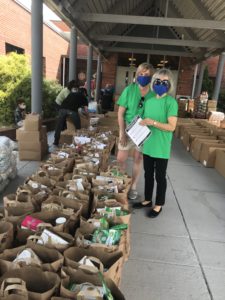 It also provides clothing and other necessities to individuals. Currently, we have a volunteer who will shop for the needed clothing and hand it to the individual outside at a safe six-foot distance.”
It also provides clothing and other necessities to individuals. Currently, we have a volunteer who will shop for the needed clothing and hand it to the individual outside at a safe six-foot distance.”
The number of volunteers is currently lower because of COVID-19 precautions, Mrs. Unbehaun noted.
“But in May, we had 44 volunteers return to the food pantry and warehouse to assist with our mission to serve those in need,” she said. “In June, our volunteers in the warehouse and thrift store are gradually and safely returning. The pantry requires approximately 10 people to run it efficiently, so staff has pitched in during this unprecedented time.”
The emergency-assistance food pantry has many resources for food and supplies, including Second Harvest Food Bank, which is East Tennessee’s largest provider of food to people in need and is reporting that it is currently distributing twice the amount of food than it did in 2019.
“Second Harvest is part of Feeding America food banks, and we are fortunate to have this organization so close to Knoxville,” Mrs. Unbehaun said. “Each week, as an agency partner, we order thousands of pounds of food to distribute to those in need. Second Harvest provides food at lower cost or free to partner agencies. Currently, fresh produce is available free of charge.”
The Ladies of Charity pantry also obtains food via “food rescue.”
“Food rescue is food that is donated to organizations from grocery stores, restaurants, or other businesses,” Mrs. Unbehaun said. “We receive food rescue from local grocery stores each week. Two primary stores are Walgreens and Fresh Market. Trader Joe’s and Walmart generously provide the grocery bags for our use.”
Food donations also come “from many community residents, parishes, and food drives,” Mrs. Unbehaun added.
“Ladies of Charity is blessed with many food donations from individuals who are staying home due to coronavirus but want to help in other ways,” she said.
“The Sacred Heart Knights of Columbus recently collected pasta, and the St. Vincent de Paul Society collected pasta, cereal, and other needed staples.”
Monetary support is used to purchase food items from Second Harvest and local grocery stores to have a nutritious food selection in each bag, Mrs. Unbehaun said.
“Ladies of Charity has fresh produce, fresh milk, margarine, bread, eggs, and frozen-meat products as well as canned and packaged items,” she said. “Food-rescue items add variety to the standard bag of food. Just today, we received a donation of eggs from Floating Goats Farm, 16 dozen organic eggs from their local farm. They are All Saints parishioners (Mr. and Mrs. Keith Eyers).”
The coronavirus closed the Ladies of Charity from March 13 to early May. The board of directors decided in favor of protecting the health of members and volunteers and closed the facility. Many members and volunteers are older and would be at high risk if exposed to COVID-19, Mrs. Unbehaun said.
“However, [Knoxville] Mayor [Indya] Kincannon and the health department approved of the new design of the drive-through food pantry and deemed it an essential service to Knox County residents,” she said. “The staff returned to work after a brief unemployment period and prepared to serve clients and open the thrift store.”
Procedural changes include signs indicating proper hygiene and safety precautions. Masks are required, and hand-sanitizer use is encouraged. [Knox County] Commissioner [Evelyn] Gill provided additional masks to distribute to clients and customers. Each volunteer area is limited to one or two volunteers working six feet apart, unless they are a married couple who quarantined together.
The pandemic has increased the demand at the Ladies of Charity.
“Our client count is up 37 percent; we are not asking for identification until June 15; and repeat clients are welcomed,” Mrs. Unbehaun said. “We expanded service on Tuesday night from 3 to 5 p.m. for working individuals and Hispanic families. No identification is required, and it is a very busy time for the pantry. It is common to have over 80 cars in line. There are new clients who need help during this high unemployment, but our demographic information is very brief, to limit the staff’s exposure to others.”
Monetary donations “have kept Ladies of Charity afloat during the past three months,” Mrs. Unbehaun said.
Without financial support, the Ladies of Charity would have been struggling to purchase food items, she said. “We also received four grants during this period: a Walmart community grant, an Akima grant, [and grants from the] J. and F. Thie Foundation and Food Lion.
The Ladies of Charity have also received help from the St. Vincent de Paul District, the St. Vincent de Paul Society at St. Francis of Assisi Parish in Townsend, Southland Transportation, Borden Milk, the Hayley Davis Fellowship Group, Diocese of Knoxville Hispanic Ministry, the Cathedral of the Most Sacred Heart of Jesus St. Vincent de Paul Society and Sacred Heart Knights of Columbus, Holy Ghost Parish Knights of Columbus, All Saints Parish and its youth ministry, the parish and volunteers of Holy Cross in Pigeon Forge, and private donations.
The Ladies of Charity food pantry stocks perishable and nonperishable food products, diapers and baby formula, toiletries, cribs and car seats, medical supplies, work boots, and adult hygiene items. Baby layettes are also distributed to infants under 3 months of age. Homeless food bags require canned food items with pop-top lids. “Meat products that are easy to chew — Spam, Beanie Weenies, spaghetti, and meatballs — are always needed,” Mrs. Unbehaun said. “A homeless bag has plastic silverware and napkins, and a person can eat most items without access to a stove. We stock canned soup, pasta, spaghetti sauce, corn-muffin mix, cereal, and macaroni and cheese as just some of the items in the pantry.”
In 2016, the Ladies of Charity received a St. Mary’s Legacy Foundation grant for a walk-in cooler and freezer.
“This has been a game changer for the fresh-food products,” Ms. Unbehaun said. “Frozen meat, fresh eggs, and produce are kept safely in these units.”
The food-pantry demand has been increasing in recent weeks “but will level off as unemployment levels decrease and we start using our new assistance database,” Mrs. Unbehaun said. “The database will limit the number of visits an individual can have to our food pantry and encourage usage of other pantries in the area. Second Harvest has a list of all the food pantries in an 18-county region they serve.”
As a United Way of Greater Knoxville community partner, the Ladies of Charity is one of many food pantries in Knoxville, Mrs. Unbehaun noted.
“The major difference with our food pantry is it is just one service of many available to individuals who are struggling,” she said.
“We may help with food, or pay a portion of a utility bill, or help a Family Promise client with their referral. Helen Ross McNabb social workers bring individuals in for help regularly, or they may pick up a car seat so an infant can go home from the hospital.”
Virtually every penny the Ladies receive goes toward the food pantry or thrift store.
“In 2019, 93 cents of every dollar was used for the emergency-assistance program,” Mrs. Unbehaun said. “We provided almost $200,000 in free clothing.”
The Ladies of Charity is an affiliate of the Diocese of Knoxville and follows the principles of St. Vincent de Paul, St. Louise de Marillac, and St. Elizabeth Ann Seton, Mrs. Unbehaun said. “The corporal works of mercy: ‘feed the hungry,’ ‘clothe the poor,’ ‘give drink to those who thirst’ … I would invite anyone to volunteer and see firsthand what the mission is here,” she said.
“During the COVID-19 pandemic, a man stopped by the drivethrough food pantry and handed us a check. He said, ‘I drive by every morning and see you all out here helping all these people.’ God is present at the Ladies of Charity, and the good work we do to honor Him is a blessing to us. The poor accepting our help is a blessing to our volunteers.”
St. Anthony of Padua Parish, Mountain City
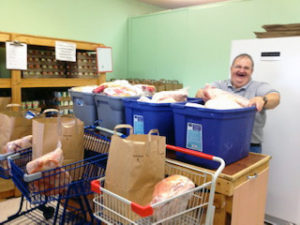 A major food-pantry service has been going on for years in the diocese’s northeast corner. St. Anthony Bread operates out of one of the diocese’s smallest parishes but feeds a great number of people.
A major food-pantry service has been going on for years in the diocese’s northeast corner. St. Anthony Bread operates out of one of the diocese’s smallest parishes but feeds a great number of people.
“St. Anthony Bread was an outreach to the Johnson County community before the church was even built,” said pantry director Leni Smith. “Father Tom Vos, a Franciscan priest, came to the Mountain City area to help the poor. At that time there was no Catholic community in Mountain City. Catholics either attended Mass in Elizabethton or Boone, N.C. The Catholics in the community gravitated to Father Tom, and through him a Catholic community came together.
“He determined that the best way to serve the poor in the area was through a food pantry. This was in the late 1990s. The church was built in 2001 with the mission statement that it would always support a food pantry with 10 percent of the weekly collection. And the food pantry has continued since that time.”
St. Anthony Bread has no shortage of helpers.
“We have over 40 volunteers in many different capacities,” Ms. Smith said. “While many of these are parishioners, we also have members of the community who volunteer. Our volunteers are so generous with their time and fully support the mission to help those in need in our community.”
Likewise, the pantry has no trouble in obtaining food.
“We are fortunate to have many ways that we get donations,” Ms. Smith said. “Food donations are received from parishioners, local grocery stores, and food drives by the post office, library, middle school, and other community organizations and businesses. We also receive monetary donations from parishioners, community members, and our weekly collection. We also received over $20,000 in grants this year.
“We purchase most of our groceries from Second Harvest of Northeast Tennessee, and our budget for this is approximately $1,800 a month. We also have a Children’s Nutrition Program run by parishioner Richard Thum and have helped, each month, over 350 families with children to receive extra nutritious food such as milk, eggs, meat, whole-grain cereal and bread, yogurt, peanut butter, canned and fresh fruits, and vegetables. We received grants from the Pope Francis Charitable Trust Fund and the Bristol Motor Speedway Children’s Charities to enable us to provide this program to our clients. Most of the food for this program is purchased from local grocery stores at the cost of approximately $800 per month.”
St. Anthony Bread’s service to the public “has changed in several ways” because of the coronavirus, Ms. Smith said.
“We have seen a 35 percent increase since the pandemic,” she said. “Also, we had just begun to move into having a grocery-store model, where clients chose the foods they wanted off the shelves, thus allowing more dignity and producing less wasted food. Since mid-March we have not been able to have clients inside the food pantry and have changed to a drive-through model.
“Volunteers pre-pack bags, and these are put into clients’ cars. All volunteers wear masks and gloves, and all equipment is sterilized upon return to the building. Our Johnson County community as well as our parish community have been very generous with monetary contributions during this trying time. We are seeing many more families since the COVID-19 pandemic, and they are very thankful for the food that is provided.”
The Mountain City pantry has the means to carry a wide variety of food.
“We stock almost everything we can!” Ms. Smith said. “We receive and give out over 15,000 pounds of food each month. We have 12 freezers and a commercial refrigerator so we can keep a lot of meat, fish, and frozen fruits and vegetables on hand. We also can refrigerate meat, eggs, cheese, milk, and yogurt. Of course, we have many shelf-stable canned and dried items such as fruits, fruit juice, vegetables, beans, peas, dried milk, various mixes, soup, noodles, macaroni, and canned meals such as spaghetti and meatballs, ravioli, and beef stew.
“We also always have several kinds of cereal, granola bars, and crackers. We receive a fresh produce delivery of various fruits and vegetables early in the morning on our distribution day, and it is given that day. We try to stay away from or limit sugary items and empty calorie items.”
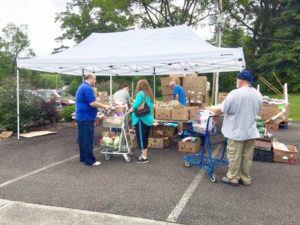 As with the Ladies of Charity of Knoxville, St. Anthony Bread provides more than just food.
As with the Ladies of Charity of Knoxville, St. Anthony Bread provides more than just food.
“We also have a clothing ministry operating out of the food pantry as well as free medical help provided by Crossroads Medical Mission once each month,” Ms. Smith said. “We have an insurance provider on-site who helps clients get free or affordable insurance.”
St. Anthony Bread has its own headquarters now.
“For years the food pantry operated out of a single room in St. Anthony Church, but thanks in part to a grant from the St. Mary’s Legacy Foundation, we were able to build a 2,800-square-foot building on the church property that is used primarily for the food pantry,” Ms. Smith said. “We began using this building in November 2018.”
Mountain City’s county is among the state’s 15 poorest by per-capita income.
“Johnson County was and is an economically depressed area, and the need for food security is ever increasing,” Ms. Smith said. “When I began working at the food pantry in 2010, we were serving approximately 80 families each month. We now help over 500 families/1,600 individuals each month. They must meet income requirements as set out by USDA and must live in Johnson County.”
Ms. Smith calls her job “minor when compared to all those who give of their time to pack bags, distribute food, unload trucks, clean the facilities, process and report client information, keep the books balanced, organize trainings, stock shelves, and the list goes on.
“We at St. Anthony Parish are very proud of our ministry and are blessed to serve God and share His love by feeding and clothing those in need. We are blessed to be living out being God’s hands and feet while joyfully serving people.”
Our Lady of Perpetual Help Parish, Chattanooga
The major Catholic food pantry in Chattanooga calls OLPH its home.
St. Vincent’s Food Pantry has been in operation for eight years. Jeff Raabeis president of the parish St. Vincent de Paul Society, which operates the pantry. About seven volunteers contribute their time to the pantry, with the coordinators being Pat Hendrickson, Mary Mabie, and Gail Raabe.
The Catholic community of Chattanooga, including the Basilica of Sts. Peter and Paul, helps St. Vincent’s Food Pantry stay supplied.
“Lots of the food is donated to us, but certain important items go quickly, like non-refrigerated milk and cereal for children,” Mr. Raabe said. “So we also do buy food often depending on the demand, but of course we work with grocers that honor our tax-free status. We do get quarterly food and donations from Sts. Peter and Paul as well as from parishioners from various other parishes.”
The coronavirus shutdown has resulted in more food donations to the pantry, Mr. Raabe said.
“The pandemic has created some very unique challenges for our ministry,” he said. “Our first priority has been to keep our volunteers safe from the virus. In order to do that, we had to suspend our face-to-face visits, which is an important part of what we do by serving not just the physical needs but also the spiritual needs as well.
“During this time of the pandemic, we have gone to mostly drop-offs of food boxes for those in need. One thing we proactively have done during this time has been to do several drive-through food drives, where it has allowed our parishioners to drive up and safely leave food on a table, and then our volunteers would go out and retrieve the food. This increased our food donation dramatically and was also a way for parishioners to be able to do something for the poor during this shut-in time.”
A change in the demographics of the people they serve has occurred during the pandemic, and it hits close to home, Mr. Raabe said.
“The primary demographic changes we have seen are more calls for assistance from our own parishioners as people deal with layoffs, furloughs, and other financial challenges since the pandemic started,” he said.
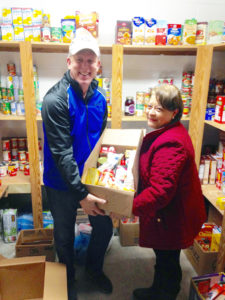 St. Vincent’s Food Pantry stocks nonperishable items, such as “canned vegetables, canned fruit, soup, canned chicken, spaghetti and sauce, instant breakfast cereal, waffle and pancake mix, bags of rice, instant potatoes, stuffing mix, macaroni and cheese, bags of beans, and peanut butter and jelly,” Mr. Raabe said. “We try to keep some bread, but that is difficult. We cannot supply fresh meats or vegetables at this time.”
St. Vincent’s Food Pantry stocks nonperishable items, such as “canned vegetables, canned fruit, soup, canned chicken, spaghetti and sauce, instant breakfast cereal, waffle and pancake mix, bags of rice, instant potatoes, stuffing mix, macaroni and cheese, bags of beans, and peanut butter and jelly,” Mr. Raabe said. “We try to keep some bread, but that is difficult. We cannot supply fresh meats or vegetables at this time.”
The pantry is located in a large storage room in the OLPH parish life center.
“Having it located in the parish life center does make it convenient for our volunteers and for doing food drives while also making it visible [with signage on the outside] to parishioners as a reminder while other events are happening in the PLC space,” Mr. Raabe said.
The demand for food-pantry services has been steady even with the reopening of businesses as coronavirus restrictions have been lifted, Mr. Raabe said.
“I smile just because unfortunately our ‘business’ is always very good,” he said. “We will never have enough to serve the demand of requests we receive, but as Jesus said, ‘the poor will always be with us.’”
The pantry is “very important” to Our Lady of Perpetual Help Parish, Mr. Raabe said.
“Even though other financial assistance is often needed by our clients like rent, utilities, bus passes, etc., being able to first sustain their physical needs of nourishment for them and their families has to be met before anything else,” he said.
St. Thérèse of Lisieux Parish, Cleveland
A note is attached to every food bag picked up at St. Thérèse of Lisieux. It reads: “God bless you and keep you/And give you His love/ God prosper your labor/With help from above/Be His strength in your arm/And His love in your soul/His smile your reward/ And His glory your goal.”
“We don’t proselytize,” said pastor Father Mike Nolan. “We simply try to evangelize.”
Susan Orman and Pat Hopkins are the main volunteers for the St. Thérèse pantry, with help from Penny Lewis, Donna Porter, and Joan Brown.
Mrs. Orman said the recent tornadoes in the area caused an uptick in demand, but the pantry usually maintains 30 food bags a week for the needy.
“Anyone who comes and requests a bag is provided a bag; there’s no turning away of anyone,” she said.
Donations to the food pantry since the pandemic began have increased “exponentially, without a request,” Father Nolan said.
“They just came on board with a lot more food,” Mrs. Hopkins said of parishioner donations. “We were surprised. This is a lot more than we usually maintain. We always have enough for the 30 baskets, and we would go shop, because some people donate money toward the pantry.”
During the pandemic, Mrs. Orman said, “What we found was that one of our parishioners, Janet Allen, did an awesome job for us. There were several folks who wanted to give money, and what they did was they gave it to Janet. Janet went out I think probably every day. She would check in to see what our needs were, and based on what our needs were she would take that money and she would fill in all the gaps. It was great.”
The St. Thérèse volunteers have no way of knowing if the pandemic changed the demographics of those they serve because they do not see the people who pick up the food bags. The bags are prepared in a kitchen off the parish office and are left in the office.
“We just make up the baskets and set them out,” Mrs. Hopkins said. “We don’t know who picks them up or where they come from.”
“We don’t keep track,” Father Nolan said. “We’re just available for people who need it.”
Feeding the hungry is one of the most innate Christian acts, and Mrs. Hopkins said “It really fills my heart to know that I can be just a little part of it.”
The St. Thérèse pantry normally doesn’t stock perishables, but occasionally donations of them force the volunteers to adjust.
“Sometimes people will bring in 20 dozen eggs,” Father Nolan said.
“Summer vegetables” will come in sometimes, Mrs. Hopkins said.
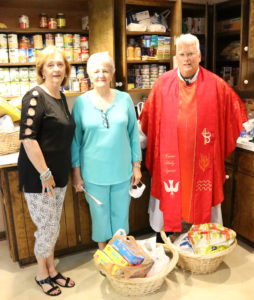 “We’ll have somebody that’ll bring 20 or 30 loaves of bread,” Mrs. Orman said. “We provide two vegetables, a soup, a fruit, crackers, cereal, and then the makings for a meal in each bag. If we have extras, if we have ketchup or mayonnaise or mustard or treats of some kind, candies or cookies or chips, whatever anybody brings is what we put into each one of the bags.”
“We’ll have somebody that’ll bring 20 or 30 loaves of bread,” Mrs. Orman said. “We provide two vegetables, a soup, a fruit, crackers, cereal, and then the makings for a meal in each bag. If we have extras, if we have ketchup or mayonnaise or mustard or treats of some kind, candies or cookies or chips, whatever anybody brings is what we put into each one of the bags.”
“If they don’t fit” in the bags, then “they set them out separately,” Mrs. Hopkins said.
“If they have a need for that particular item, then they take that along with their bag,” Mrs. Orman said.
Those they help at the pantry need no credentials, Mrs. Hopkins said. “This lady happened to be out where the secretary is, and she said, ‘I hear you give out food. Do I need some identification?’ I said, ‘All you need to do is ask.’ I brought her a bag.”
The St. Thérèse pantry has been open for more than 10 years and is an important ministry of the parish.
“I tell these ladies every Monday when they’re in here, ‘Thank you for making our church look so good,’” Father Nolan said. “I think it’s very important. It’s an evangelical effort. It’s not hard. He said, ‘Feed the hungry.’ He didn’t say, ‘Ask how they got there.’”
The mission to feed the hungry led Father Nolan to keep the parish office open despite the shutdowns caused by the coronavirus in so many other areas.
“Frankly, that’s why our office stayed open through all of this,” the pastor said. “Certainly I didn’t require our staff to be here, but I met with them and I asked if they would be comfortable with one of them coming in each day, and if so, work out a calendar. Other things of course go on in a church office, but when somebody’s hungry, you don’t want them to find a locked door.”
While St. Thérèse parishioners were unable to come to Mass before the churches reopened, “they’ve been coming all week long dropping off food,” Father Nolan said.
Holy Cross Parish, Pigeon Forge, and St. Mary Parish, Gatlinburg
“God will never leave or forsake us,” – Deuteronomy 31:6.
For Hispanic residents in Sevier County, this Bible verse has been their only hope and support during the pandemic.
Many of the Hispanic residents were unemployed since the beginning of 2020 because of the “dead season”: the winter months when there are very few tourists for Sevier County’s tourism-dependent economy, and their only hope was in God.
Then a miracle happened amid the hunger. Members of Holy Cross Parish in Pigeon Forge reached out to their own parishioners as well as parishioners at St. Mary in Gatlinburg and began food drives, with food donated from many different sources. The need was so large that the churches opened their pantries to the entire community.
Holy Cross parishioner Terry Aparicio said there would be no food available until Wednesdays during the week, “when provisions started to fall like manna.”
“There were days announcing massive rain … and we had a great sunshine. Blessed be our God,” Ms. Aparicio said.
She said a double blessing occurred May 28, when the Diocese of Knoxville Office of Hispanic Ministry helped connect the efforts of Holy Cross and St. Mary with the Ladies of Charity, which came to the rescue.
“They took over the entire distribution,” Ms. Aparicio said. “They brought two trucks full of food that included nonperishables and fruits and vegetables. The nonperishables were already packed in large bags with handles, and their volunteers and ours prepared the other bags with the perishables. … They brought many volunteers. They had flyers in Spanish as published by the health department regarding protection against the coronavirus, which they placed in every bag.”
“They brought disposable masks as well for every bag. They even brought all the volunteers lunch and water. We have never seen such a professional and caring organization,” Ms. Aparicio added. “Susan Unbehaun [Ladies of Charity executive director] explained that many volunteers contributed to the food-drive effort, whether in monetary or goods donations, picking up food, packing the bags, loading, or helping elsewhere. They honestly showed their love for being the hands of our Lord in serving the ones in need. From all the parishioners of Holy Cross in Pigeon Forge and St. Mary in Gatlinburg, thank you! May our Lord reward you with many blessings.”
Mrs. Unbehaun said “the special food distribution for Hispanic families of Holy Cross-Pigeon Forge and St. Mary’s-Gatlinburg attracted support from so many individuals, groups, and businesses. We were blessed to have this support and able to feed many families who were unemployed or underemployed during the pandemic. Over
200 families were given food.”
Ms. Aparicio said the other half of the “double blessing” was Jim Moretti from the Society of St. Vincent de Paul at St. Francis of Assisi in Townsend, who provided the community with a trailer full of Second Harvest boxes left over from the St. Vincent de Paul Society food drive, as well as cleaning supplies donated by the Townsend IGA store that were given to the Women’s Care Center in Sevierville.
“In our darkest time, our Lord hears us. In Matthew 28:20, our Lord tells us ‘I will be with you always, even until the end of the world,’” Ms. Aparicio said.
Crazy Quilt Friendship Center, Newcomb
Crazy Quilt Friendship Center is composed of a food pantry and emergency-assistance program and community summer programs. It serves as a critical resource available for low-income families in the Newcomb area, an Appalachian community near Jellico, Tenn. The food pantry and emergency-assistance program at Crazy Quilt provide food boxes and assistance with utilities. Recipients are eligible every three months, as resources are available. Crazy Quilt served more than 470 individuals last year.

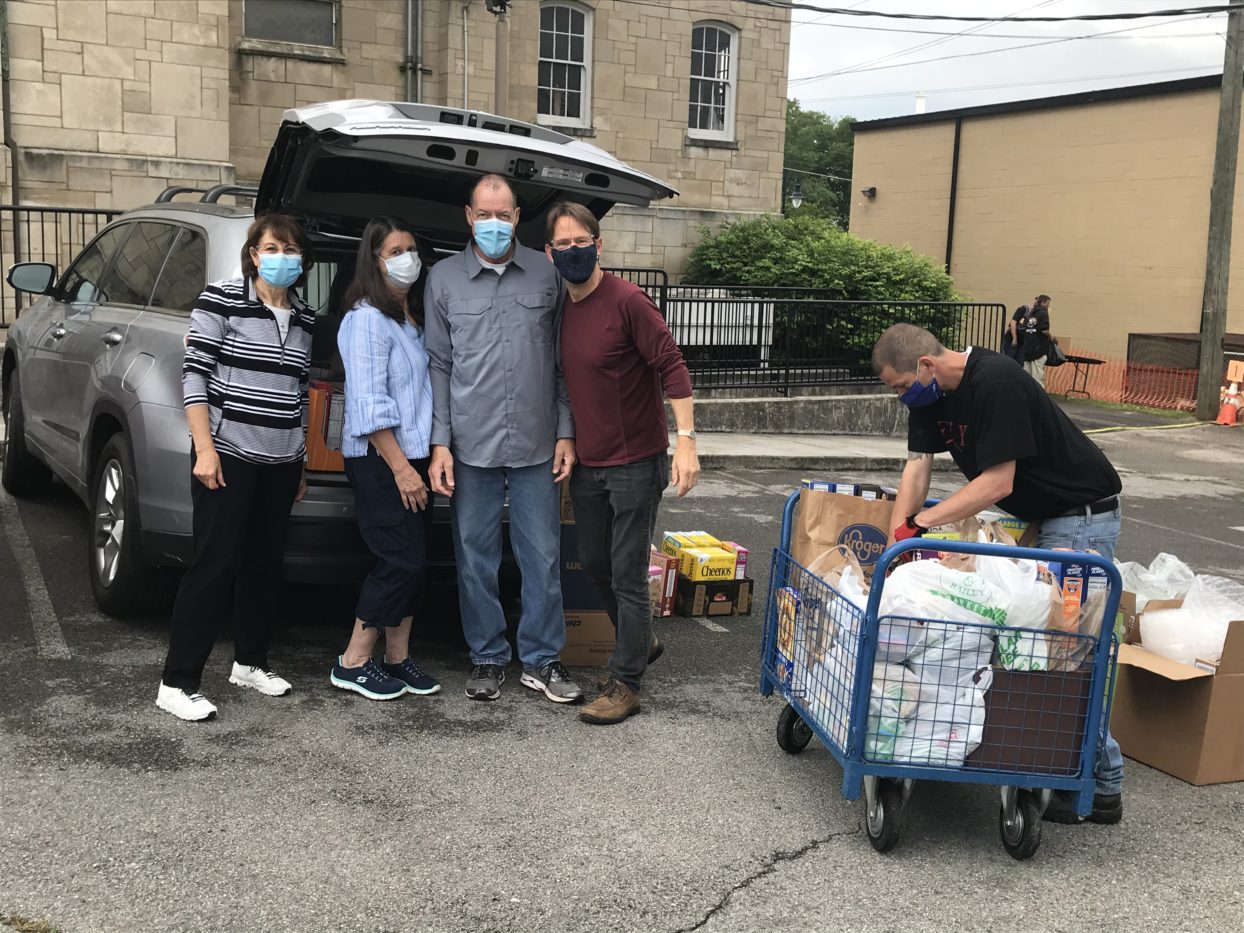
Comments 1
Thank you all for your dedicated work and service during this time of the pandemic. God bless you!